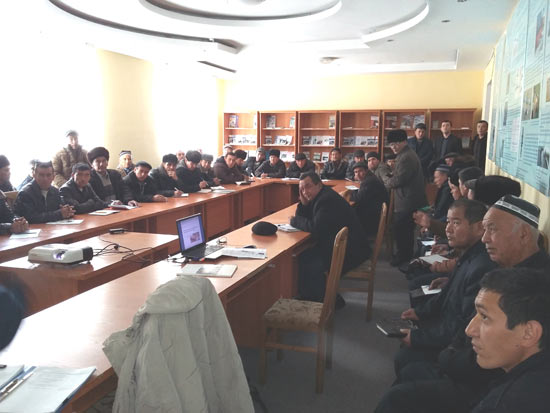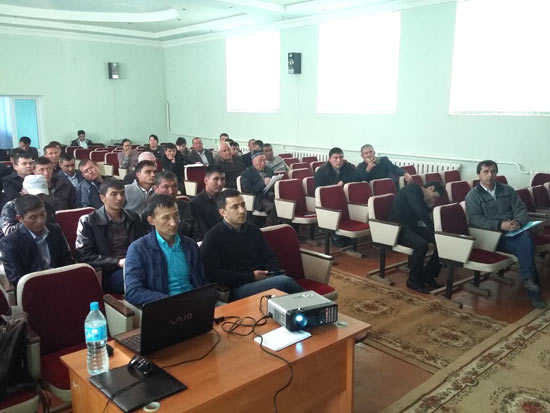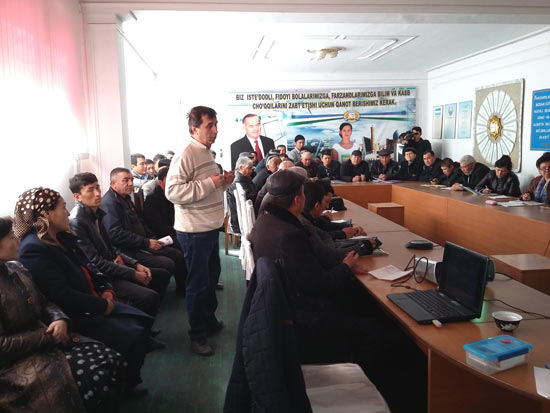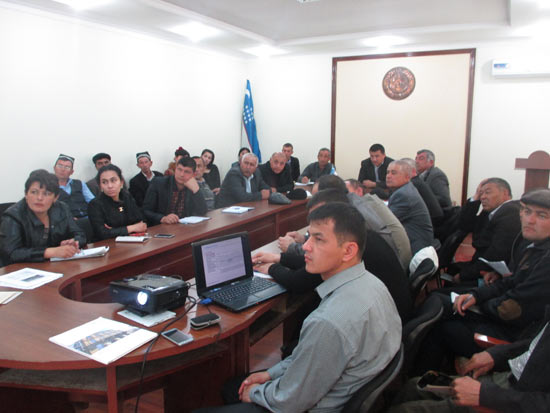WATER SECTOR PROFESSIONAL DEVELOPMENT
IN THE REPUBLIC OF UZBEKISTAN
Professional development is the integral part of the implementation of the ongoing education concept defined by the National program for personnel training in the Republic of Uzbekistan.
Water sector professional development facilitates the personnel development and further builds institutional capacities in the sector through new knowledge, improved skills and capabilities.
Professional development of water managers and staff is one of the tasks of the Ministry of Agriculture and Water Resources (MAWR) in the Republic of Uzbekistan and its Central Water Administration (CWA).
The Scientific Information Center of the Interstate Commission for Water Coordination in Central Asia (SIC ICWC) has been closely cooperating with CWA since 2014 in organization of training courses as part water sector professional development, including selection of topics to be taught, preparation of training materials (lectures) to be delivered at the Center of professional development at the Tashkent Institute of Irrigation and Land Reclamation (TIIM) and in the provinces of the Republic.
Water sector professional development was further encouraged by the Order of the Minister of Agriculture and Water Resources on organization of professional development courses for the water sector (¹16 of February 2, 2015).
On the basis of the abovementioned Order and other relevant orders by the Head of CWA, since February 2015 the courses designed for different hierarchical level have been held twice a year – winter-spring session and autumn-winter session - all over the country.
Thus, three-day courses were held from February to May 2015 (winter-spring session), with two days of theoretical sessions and one day of practical exercises.


Deputy heads of the Basin Irrigation System Administrations (BISA), executives of the Irrigation System Administrations (ISA), Main Canal Administrations (MCA), Administrations of pumping stations, energy supply and communication (APSEC), Hydrogeology and Ameliorative Expeditions (HGAE), offices of the Water Inspection Board “UZSUVNAZORAT” in the Republic of Karakalpakstan and provinces, heads of Water Use divisions and other leading specialists of Water Management Organizations (WMO) participated in the courses.
The professional development courses were held using a cluster method i.e. courses held in one place for several provinces. These courses were organized in three batches (series):
- The first batch: February 9-26, 2015;
- The second batch: March 16 – April 1, 2015; and
- The third batch: April 16 – May 2, 2015.
In total, 638 trainees were trained from about 100 WMOs (of BISAs, ISAs and others) during the winter-spring session (1st batch – 231, 2nd batch – 219, 3rd batch – 188 trainees).

One-day courses for Water User Associations (WUA) were held in each province of the country from November 25 to December 4, 2015 (autumn-winter session).
Deputy Heads and other leading specialists of BISAs, ISAs and heads of WUAs from relevant areas (command areas of IS) participated in the courses. In total, 336 trainees were trained during the autumn-winter session 2015, including:
- The courses in Fergana city – 105 trainees from Andizhan (31), Namangan (25), and Fergana (49) provinces;
- The courses in Gulistan city – 79 trainees from Djizak (23), Syrdarya (16),Samarkand (21), and Tashkent (19) provinces:
- The courses in Karshi city – 90 trainees from Bukhara (25), Kashkadarya (34), Navoiy (6), and Surkhandarya (25) provinces; and
- The courses in Urgench city – 62 trainees from the Republic of Karakalpakstan (38), and Khorezm province (24).
Thus, 974 water specialists were trained in total during 2015.
In the first quarter of 2016, the next professional development courses were organized.

Specialized two-day courses for hydrometry specialists of all ISAs and their regional branches were held from January 28 to February 11, 2016. These courses again were organized cluster-wise in the following cities:
- Andizhan (January 28-29, 2016): 48 trainees from Andizhan, Namangan, and Fergana provinces;
- Djizak (February 1-2, 2016): 56 trainees from Djizak, Samarkand, and Syrdarya provinces;
- Karshi (February 4-5, 2016): 55 trainees from Bukhara, Kashkadarya, Navoiy, and Surkhandarya provinces;
- Urgench (February 8-9, 2016): 37 trainees from the Republic of Karakalpakstan and Khorezm province; and
- Tashkent (February 10-11, 2016): Tashkent province (28 trainees).
In total, 224 hydrometry specialists were trained all over the Republic.
The professional development courses on hydrometry were organized by MAWR in cooperation with the Research Institute of standardization, metrology and certification (RISMC) and SIC ICWC in Central Asia. RISMC and SIC ICWC organized theoretical and practical sessions for the hydrometry specialists.
Two-day courses were held in all provinces from February 12 to March 19, 2016.
Similar to 2015, according to CWA instructions, the training courses were organized on the following three topics:
- Operation of irrigation systems and hydraulic structures;
- Reclamation of irrigated land; and
- Water management, accounting and efficient use.
In addition, the following two general topics regarding Uzbekistan’s policy in the area of national and transboundary water use were addressed:
- Water sector and water resources in the Republic of Uzbekistan;
- Transboundary water relations in Central Asia.
Particularly, the lectures addressed the water sector in the Republic of Uzbekistan, the policy related to application of modern water conservation technologies and the achieved results in the sphere of water security, as well as prospects for the development of the national water sector in the light of sustainable development. A special focus was on the leading role of Uzbekistan in Central Asia, in particular, in supporting regional water management institutions (ICWC in Central Asia and its Executive Bodies, etc.); country’s commitments to the International Water Law – adherence to regional agreements and the two global Water Conventions:
- The UNECE Convention on the Protection and Use of Transboundary Watercourses and International Lakes (1992);
- The UN Convention on the Law of the Non-navigational Uses of International Watercourses (1997).
Heads and other leading specialists of BISAs, ISAs, MCAs, APSECs, HGAEs, as well as heads of WUAs of relevant areas (command areas of IS) took part in the courses held from February 12 to March 19, 2016.
SIC ICWC experts and representatives of CWA, as well as those who are responsible for improvement WUA’s activity in relevant provinces and Karakalpakstan participated in the courses.
Based on the proposals submitted after the courses 2015, these new courses were organized individually in each region of the country.
Lecturers of SIC ICWC held them in the following places:
- (1) Tashkent (February 12-13, 2016) – Tashkent province (91 trainees);
- «Tashkent – Fergana valley – Tashkent» route:
- (2) Namangan (February 15-16) – Namangan province (140 trainees),
- (3) Andizhan (February 17-18) – Andizhan province (176 trainees),
- (4) Fergana (February 19-20) – Fergana province (178 trainees);
- (5) Djizak (February 22-23) – Djizak province (129 trainees),
- (6) Gulistan (February 24-25) – Syrdarya province (125 trainees);
- «Tashkent – Termez – Karshi – Tashkent» route:
- (7) Termez (February 29 – March 1) – Surkhandarya province (138 trainees),
- (8) Karshi (March 3-4) – Kashkadarya province (179 trainees);
- «Tashkent – Bukhara – Navoi – Samarkand – Tashkent» route:
- (9) Bukhara (March 9-10) – Bukhara province (176 trainees),
- (10) Navoi (March 11-12) – Navoyi province (61 participants),
- (11) Samarkand (March 13-14) – Samarkand province (135 trainees).
- «Tashkent – Karakalpakstan – Khorezm – Tashkent» route:
- (12) Urgench (March 16-17) – Khorezm province (160 trainees),
- (13) Nukus (March 18-19) – Republic of Karakalpakstan (199 trainees).
According to information provided by local coordinators of the courses, in total 1877 trainees were trained.
In sum, more than 2100 water specialists were trained in the courses, including specialized hydrometry courses during the winter-spring session 2016 (January-March).
Totally, 3075 specialists were trained during 2015 and the first quarter of 2016.
SIC ICWC analyzes the results of the courses, reflects on them and submits proposals to CWA on the organization of courses, their format, and the content of training materials.
The trainees showed their interest in the issues related to transboundary use of water in the world and interstate water relations in Central Asia, Uzbekistan’s policy, International and National Water Laws, and to the national water sector reforms .
Below are some conclusions based on the analysis of the courses and suggestions of the trainees:
- The format of courses proposed by CWA is quite acceptable;
- Organize the courses on specific topics for trainers from all the provinces and Karakalpakstan in one place, for example, in Tashkent, so that they could deliver these lectures in their BISAs;
- Organize additional courses on the specialized topics that are of interest for trainees (GIS technology, etc.);
- Take into account suggestions made by decision-makers of BISAs and potential trainees while preparing training materials for the courses;
- Provide trainees with handouts.
During the courses the issues related to the activity of WUAs were also discussed. The main problems they face were identified as follows:
- Many WUAs do not have water control structures and devices for water accounting; some of them are not equipped with gauging stations;
- Receivables and payables of WUAs: problems related to debt collection (the vast majority of debtors are farms);
- Delays in the receipt of funds allocated by the state (soft loans) for production of cotton and wheat;
- Problems related to contractual relations among WUAs and State Water Management Organizations, WUAs, farms and mahallas (local self-governing bodies);
- Poor material and technical basis.
These and other problems are studied and will be taken into account while making recommendations for the improvement of the courses (training materials) for water and agricultural sector in the Republic.
Professional development division, SIC ICWC
|